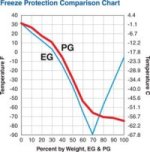lilranch2001
Super Member
- Joined
- Nov 25, 2009
- Messages
- 8,392
- Tractor
- Bobcat CT 235
I know antifreeze goes bad in a cooling system, do I know all there is to know, absolutely NO.
But I am getting ready to do a change on my bobcat CT 235, and have most of a jug (50-50) premix left from 4 years ago.
Does antifreeze break down in the jug or does it need to be in contact with the metal parts of the system to initiate degradation?
I am not afraid to show my ignorance on this matter, and I am sure some of you guys out there know the answer.
But I am getting ready to do a change on my bobcat CT 235, and have most of a jug (50-50) premix left from 4 years ago.
Does antifreeze break down in the jug or does it need to be in contact with the metal parts of the system to initiate degradation?
I am not afraid to show my ignorance on this matter, and I am sure some of you guys out there know the answer.
